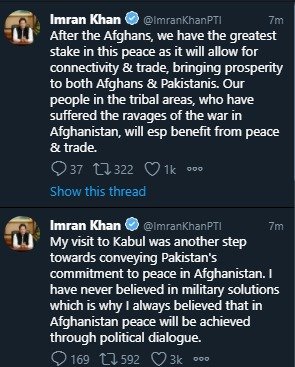- Joined
- Oct 2, 2004
- Runs
- 217,977
ISLAMABAD: Prime Minister Imran Khan will travel to Kabul on Thursday at the invitation of Afghan President Ashraf Ghani, confirmed Pakistan's envoy to Afghanistan Mansoor Ahmed Khan.
"Prime Minister Imran Khan visiting Kabul tomorrow for meeting Afghan President Ashraf Ghani to discuss strengthening of bilateral ties," said Ambassador Mansoor.
Last week, Afghan Foreign Affairs Ministry Spokesperson Gran Hewad had announced that the PM Imran's visit will focus on the Afghan peace process and strengthening political, security, trade and economic ties will be discussed during this trip.
"The trip happens after President Ghani’s telephonic conversation with Imran Khan last month," Hewad was quoted by Afghan media outlet Tolo News.
This will be PM Imran's first visit to the war-torn country since assuming office in 2018.
The visit comes as the stalemate continues in the Afghan peace talks being held in Doha between the Afghan government and Taliban to end the more than decade long conflict in the country.
PM Imran has maintained that there is no military solution to the Afghan conflict. He has also backed the peace process and a political solution in the country brought about by the people of Afghanistan.
The PM has stated multiple times that the peace in Afghanistan would be beneficial for the entire region as it would create new opportunities for trade and economic cooperation as well as regional connectivity.
The visit also comes day after PM's Adviser on Commerce and Investment Abdul Razzak Dawood returns from a three-day trip to Afghanistan.
Dawood had held meetings with Afghan President Ashraf Ghani, and other leaders of the country.
"Prime Minister Imran Khan visiting Kabul tomorrow for meeting Afghan President Ashraf Ghani to discuss strengthening of bilateral ties," said Ambassador Mansoor.
Last week, Afghan Foreign Affairs Ministry Spokesperson Gran Hewad had announced that the PM Imran's visit will focus on the Afghan peace process and strengthening political, security, trade and economic ties will be discussed during this trip.
"The trip happens after President Ghani’s telephonic conversation with Imran Khan last month," Hewad was quoted by Afghan media outlet Tolo News.
This will be PM Imran's first visit to the war-torn country since assuming office in 2018.
The visit comes as the stalemate continues in the Afghan peace talks being held in Doha between the Afghan government and Taliban to end the more than decade long conflict in the country.
PM Imran has maintained that there is no military solution to the Afghan conflict. He has also backed the peace process and a political solution in the country brought about by the people of Afghanistan.
The PM has stated multiple times that the peace in Afghanistan would be beneficial for the entire region as it would create new opportunities for trade and economic cooperation as well as regional connectivity.
The visit also comes day after PM's Adviser on Commerce and Investment Abdul Razzak Dawood returns from a three-day trip to Afghanistan.
Dawood had held meetings with Afghan President Ashraf Ghani, and other leaders of the country.
Last edited:








